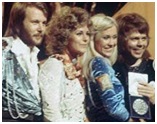|
 |
|
 |
|
|
||
The Battle of Waterloo - Leadership and Strategy
The Battle of Waterloo (1815)
Famous for... 1. Napoleon's defeat The British, Dutch and Prussian (German) victory over the French (led by Napoleon Bonaparte, pictured right) on 18th June 1815
2. Wellington's victory The victorious British army was led by the Duke of Wellington.
3. Abba Abba had a number one hit, Waterloo, about the battle which won the Eurovision Song Contest in 1976 (pictured right after winning).
Why is the battle important? It ended the Napoleonic Wars. These were caused by the French leader, Napoleon Bonaparte’s invasions of other European countries like Austria and Russia.
Why was it called Waterloo? Waterloo is a village in Belgium near to the battlefield.
The opposing armies – leaders and troop numbers Napoleon Bonaparte (French) – 123,000 troops, who fought against:
Why did Wellington win?
1. His leadership Why was he a great leader?
a) strict discipline (his nickname was the Iron Duke). His discipline was essential because many of the German and Dutch-Belgians in his army were inexperienced and unreliable.
b) strategy Wellington chose a defensive battle because it would have been difficult to attack with his multi-national army.
c) character and visibility He earned his men's trust and respect through his
Wellington bravely rode 20 miles during the battle directing his troops and led them from the front.
d) information Wellington got great information about the enemy from:
e) empowerment He closely controlled his army (to make sure it kept to his battle plan). But his officers were allowed to act on their own initiative (as Sir John Colbourne, pictured right, did leading the successful Oxfordshire Regiment infantry attack).
f) self-confidence This allowed Wellington to:
g) administrative efficiency Wellington transformed:
2. Napoleon’s mistakes and problems
a) his army This was too small to cope with both the British and Prussian armies His best troops also died in his Russian invasion of 1812.
b) the wrong battle A defensive battle in France would have been more successful for Napoleon.
c) the Prussians 33,000 of Napoleon’s troops:
Napoleon:
d) poor control Napoleon allowed his deputies to make important mistakes:
3. Prussian support The Prussian attacks on the French eastern flank:
The Prussian leader, Gebhard von Blücher, pictured right, inspired his troops with his:
If they were short of food, he would eat only boiled potatoes!
4. The battlefield Wellington chose a small (around two square miles, over 5 million square metres) battlefield, which :
5. Luck Wellington was also helped by pre-battle rain which slowed down the enemy and delayed Napoleon's initial attack.
The battle’s key
moments
11.30 am French attack the chateau of Hougoumont which the British successfully defend. Napoleon’s delayed attack gives the Prussians more time to help Wellington.
1.30 pm French unsuccessful infantry attack (led by Marshal d’Erlon). Wellington counter-attacks with:
Around 4 pm Marshal Ney, pictured right, (without Napoleon’s approval) makes a series of unsuccessful cavalry attacks against the British and Dutch-Belgian troops .
Around 4.30 pm The Prussian army attacks the French right flank.
About 6 pm The French infantry capture the farmhouse of La Haie Sainte But they can’t exploit this vital strategic position due to shortage of troops (caused by the Prussian attack).
Late evening Final victory after Napoleon’s Imperial Guard is defeated This is helped by the Oxfordshire Regiment’s successful infantry attack (led by Sir John Colbourne).
Results of the battle
1. Thousands killed Estimates are:
2. Rule Britannia Britain became the dominant world power, helped by:
3. Peace in Europe until 1914 Peace encouraged:
4.Wonderful Wellington In Britain he became:
5. Napoleon’s nemesis Napoleon was:
He died there in 1821.
Key quotes
Nothing except a battle lost can be half so melancholy as a battle won. - Duke of Wellington (reflecting on the casualties after the battle)
In all my life I have never experienced such anxiety, for I must confess I have never been so close before to defeat. - Duke of Wellington.
It was a damn close run thing, - Duke of Wellington (after the battle).
The art of war is a simple act; everything is in the performance.
Note Wellington probably didn’t say the famous quote: The battle of Waterloo was won on the playing fields of Eton. |
|
|
||
|
|
||
| Copyright © wisdomtowin.com 2025 All Rights Reserved | ||
|












